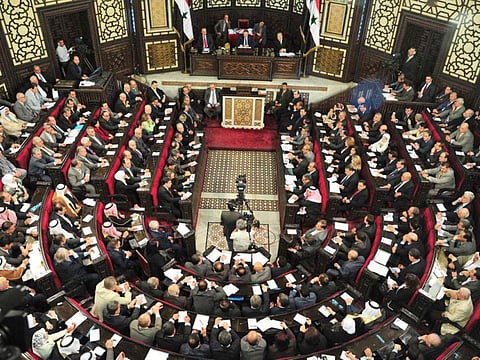How Russia is quietly pushing political reform in Syria
Moscow believes it is ‘bad politics’ to continue using Baathist ideology

Dubai: While the world focuses on Russian military jets in the skies of Syria, Moscow is quietly engineering political changes within the Syrian political system, ahead of parliamentary elections next May, sources close to the government told Gulf News.
With minimal media attention and little fuss, the Syrian Baath Party dissolved its 21-man strong National Command this week, which had been in power since 1970.
The Syrian government ordered that all their offices, automobiles, state funds, and human resources to be re-distributed within the political system.
The symbolic move was at the urging of Russian advisers, ahead of upcoming parliamentary elections next May. Not only do the Russians see such public spending as a complete waste, but the National Command has become a subject of ridicule in Syria for years, with its ageing autocrats ideologically stuck in the 1960s with flashy cars, government funds, and all the pomp of authority.
The party hasn’t officially elected a secretary-general since Syrian President Bashar Al Assad’s father, Hafez, died in 2000, leaving its leadership in the hands of the octogenarian Baathist Abdullah Al Ahmar.
For more than four decades the Baath party monopolised power through a constitutional clause that mandated that the party was “leader of state and society”.
That clause was scrapped in the 2012 constitution but on the ground, nothing has changed for the Baath.
Party members still get the lion’s share of seats in government and parliament, and pack the bureaucracy and armed forces.
The day of their seizure of power, March 8, is still officially celebrated.
The reset seats of the Baath Party will be waivered in the next elections, thanks to Russian lobbying in Damascus.
The Russians believe that it is bad politics to continue using Baathist ideology, and are working on reforming the party from within.
The National Progressive Front (NPF), a leftist parliamentary coalition headed by the Baath, is expected to be dissolved by May.
It has had the lion’s share of seats in Parliament since 1973. The only Baath ally that will survive the Russian shake-up is the Syrian Social Nationalist Party (SSNP), a left-wing party created in the early 1930s.
It commands a real power base and appeals to young educated men and women in rural towns and the urban interior.
After years of working in the underground from the mid-1950s to the 2000s, it was allowed to join the NPF and is now active both in military affairs and political life, sending a representative to negotiate with Syrian officials in Geneva this February.
Although some domestic voices are demanding that the parliamentary elections are postponed, Moscow insists that they need to take place as planned — under Russian supervision — and to produce a multi-party and democratic system, approved and backed by the Kremlin.
This chamber will work hand-in-hand with a “cabinet of national unity” that includes members of the Russian-backed opposition; attendees of Moscow I and Moscow II conferences.
The Turkish-backed Syrian opposition will be discarded, and so will the Riyadh-sponsored Higher Negotiations Committee, or any form of Syrian Islamists.
In addition to politics, changes have been noted over the past few weeks in top military positions, also believed to be the work of the Russians.
The commander of the republican guard, an elite force charged with presidential security, has been sacked and replaced by General Talal Makhlouf, a relative of the unit’s founder General Adnan Makhlouf.
Previously, Talal Makhlouf was in charge of Unit 105 of the Republican Guard, once commanded by Al Assad’s long-time friend, who defected to join the opposition in 2012. General Aws Aslan, the son of ex-Chief-of-Staff Ali Aslan, was made commander of the Second Corps of the Syrian Army.
The sidelining of an older generation of officers and replacing them with trustworthy adults in their early 50s is also an attempt at giving the armed forces a face-lift.
In the coastal city of Latakia, near the airbase of Hmaymeem, where the Russians are now based, checkpoints within the city have been removed in order to restore a feeling of confidence to local inhabitants, and soldiers on street-corners have been sent to the frontlines in the Syrian north — again at the advice of Moscow.
Sign up for the Daily Briefing
Get the latest news and updates straight to your inbox



